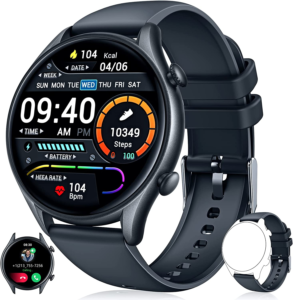Assistive technology devices helps people live independent, healthy, and happy lives. When we talk about “assistive technology,” we mean a wide range of tools and systems, such as screen readers, mobile phones that are easy to use, telecare, and memory aids.
This guide will tell you about the different kinds of technology that can help older people. Let’s look at what assistive technology devices are and their benefits.
What Is Assistive Technology Device?
An assistive technology device is any tool, piece of equipment, gadget, or gizmo that helps a person live the whole, independent, and satisfying life they want. Assistive technology can help many different kinds of people in different ways.
For older people, the main goal is to help them stay in their homes longer and depend less on other people and care systems.

Benefits of Assistive Devices
Assistive technology can help many different kinds of people in many different ways. For example, it can help someone with dementia remember certain things, support a stroke survivor, let a blind person use the internet, or even help a healthy older person keep their home safe.
Most of the time, electronic gadgets are the most likely to help your elderly relative. Medication reminders, pill dispensers, and telehealth systems can all be used to improve health.
With virtual assistants, visual and communication aids, and memory aids, the goal could be to help people be as independent and comfortable as possible. Assistive technology can also be used to keep your home safe and secure.
Some examples are intelligent smoke alarms, doorbells, automated lighting, and water-overflow devices. Below, we’ll give you some examples of assistive devices for people over 60.
Top 10 Assistive Technology Devices
You can buy various assistive devices to help an elderly family member get around the house and stay independent for longer. Here are some of them.
1. Wearables
Wearables or fitness trackers, like Fitbit, Garmin, and Apple Watch, are more than just fancy pedometers. They can keep track of your parent’s sleep patterns and heart rates and set alarms to remind them to take their medicine or lock the front door before bed.
You can also connect them to several apps, such as meal planners and recipes, GPS tracking, and InteliLiving.
2. Virtual Assistant
Easy-to-use tools like Google Home and Alexa can help your aging parents or other elderly persons stay in touch with their community and set alarms for medical appointments. This is one top Assistive Technology Devices for the elderly.
You can do this for them remotely, keep up with the news, and stay safe in their home. They can also use them to listen to music streaming services and check the weather.
3. Video doorbells
If you want to make your parents’ house smarter, a video doorbell is an easy place to start. Your parent will feel safer at home if their smartphone is linked to a video doorbell. So, even when they aren’t home, they can see who is at the door.
It lets them talk to delivery people and other unexpected guests without opening the front door.
4. Phones with speakers
Your elderly relatives will be able to hear the phone ring and the person on the other end of the line better if the phone is amplified. They also have loudspeakers, caller ID, and big buttons.
5. Automatic pill dispensers
These dispensers can be changed to fit the medication schedule of anyone, including the elderly. They can hold enough medicine for several days or weeks, and some have alarms that flash and beep to remind you to take your medicine.
This can make it easier for your relative to remember to take their daily medicines, which is especially helpful if they have cognitive problems.
If you are on a budget, put a smart home sensor in the drawer or cabinet where the pills are kept. This will do the same as an automatic pill dispenser and make it possible to connect the sensor to a home monitoring system.
6. Grandpad smart device
If your parents or other senior relatives are like many people from their generation and don’t feel comfortable with smart technology, the Grandpad is an excellent choice for them.
Grandpad makes it easier for older adults to stay in touch with their loved ones. It has bigger screens and icons that are easy to use.
Your parent can also use it to talk on the phone, look at websites, listen to music, send emails, take pictures, and play games that are good for the brain.
7. Smart refrigerator
A smart fridge remembers what is in it. You or your parent can use it to find out if something is outdated or needs restocking. So, you’ll know that everything in your parents’ fridge is fresh and good for them.
8. Home monitoring devices
With home monitoring systems like InteliLiving, you can keep a virtual eye on your elderly parents’ health and safety. The software doesn’t need cameras or microphones. Instead, sensors are placed in key spots around your loved one’s home.
You can keep track of their location, activity, temperature, and more from afar. Its artificial intelligence can spot patterns that could mean your parent’s health is getting worse, so you can prevent accidents. If something does happen, like falling or having a medical emergency, help can get there faster.
InteliLiving also lets you send text messages and set alarms to remind you of an appointment or to take your medicine.
9. Fire prevention
Aging makes people more prone to forgetfulness. And forgetting to take the clothes off the line is one thing, but failing to turn off the stove is another.
You can put monitors on your parents’ stoves or ovens that turn off the power or gas when no one is in the kitchen. There should always be working smoke detectors in their home.
Related: A Review: Most Popular Special Needs Strollers for Adults
10. GPS tracking
Many of us already watch our teenagers through their phones, but this technology can also help us care for our elderly parents. If they don’t have a smartphone, they can wear several pendants with GPS.
They give people peace of mind, especially those who tend to get lost. Or, give them a way to let someone know if they have trouble walking to the store or a nearby café for lunch.
The problem is that some people prefer to avoid wearing them or forget to charge them. And most GPS tracking devices can work with InteliLiving, giving you even more peace of mind.
Paying For Assistive Technology Devices

As part of a care package, your local government may give you some helpful technology for free. Local councils’ primary goal with social care is to help older people stay independent at home for as long as possible.
Assistive technology can be a cheap way to help with this, and it can often replace the need for a full-time caretaker.
For your elderly relative to get financial help from your local council, they will have to undergo care needs assessment. This will determine if they are eligible for help, what can be done to help, and how much help the council can give.
Once the needs assessment is done, a social worker can talk with you, and your loved one about the options they think could help them stay safe and independent. Many of these options include assistive technology.
These talks aim to reveal what is best for your loved one. If a specific device might help, consider it a possibility.
Depending on the situation, if your elderly relative is registered as disabled or has a long-term health condition, they may be able to get the VAT taken off of various assistive technologies. This can save you a lot of money, so you should always check to see if a product is exempt from VAT.
Ethics And The Use Of Assistive Technology Devices To Help The Elderly
There are some things to think about that could mean that your elderly relative might not be able to use assistive technology. Some people will worry or feel uneasy about digital monitoring and activity surveillance.
Most assistive technology, like motion sensors, doesn’t record activity with video or send information to anyone. However, some telecare packages and smart doorbells record and store video, which may be unsettling to some people.
Even though these products do their best to keep your privacy, it’s essential to consider this when looking into assistive technology, especially if you want to make sure your elderly relatives are happy living with you.
Regarding assistive devices, it’s also important to ask if they make tasks easier for your elderly relative or if they make it harder for your relative to spend time with others, which they enjoy.
For example, getting your parent, a digital pill dispenser might mean that they don’t need to see a social worker as often, or putting in a telecare package might mean that they don’t need as many visits from friends who help with welfare.
Conclusion on Assistive Technology Devices for the old
This is only a tiny sample of the technology that can help older people stay in their homes. The good news is that a lot of it is covered by a My Aged Care package, which can cut the amount you have to pay.
When choosing assistive technology, there are many things to think about, but when used correctly, it can help make older people safer and happier.
- Manual vs. Automated Cleaning Equipment: Which Should You Choose? - December 15, 2023
- Cost Efficiency of Investing in Professional Cleaning Equipment - December 8, 2023
- Safety Precautions When Using Professional Cleaning Equipment - November 26, 2023
